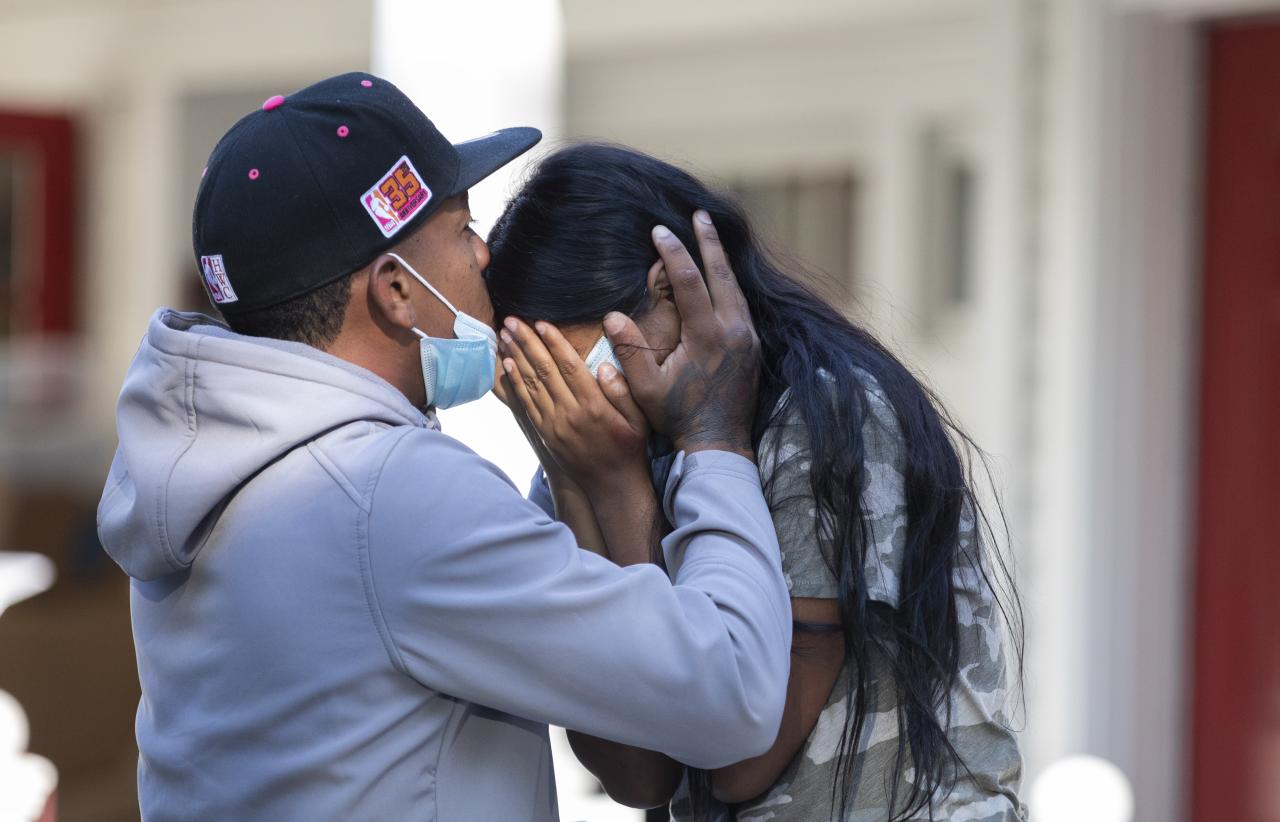Far-right President Jair Bolsonaro turned a series of Brazilian independence day events into campaign rallies on Wednesday, using mass gatherings of his supporters to reiterate his attacks on the country’s democratic institutions ahead of an October election he has repeatedly sought to undermine.
Bolsonaro, who has spent two years attempting to sabotage an election he is likely to lose by spreading baseless voter fraud conspiracies, was more restrained than usual during speeches in Brasília and Rio de Janeiro.
Advertisement
Still, he used the holiday celebration to launch broadsides against his leftist opponent, former Brazilian President Luiz Inácio Lula da Silva, and referred to the election as a battle of “good versus evil.” He repeated previous criticisms of Brazil’s Supreme Court, which he has accused of engaging in its own anti-democratic plot to rig the election, using thinly veiled references to the court to suggest that it has acted outside the bounds of the country’s constitution. And he nodded to previous democratic crises in Brazil’s history, suggesting that a new one could soon unfold.
“History can be repeated,” Bolsonaro said during a breakfast event in Brasília, the nation’s capital, while referencing the 1964 military coup that overthrew a democratically elected government and established a brutal 21-year dictatorship.
His supporters understood the message: They booed at his single direct mention of the Supreme Court, the newspaper O Globo reported. Many carried signs calling for military intervention or advocating for the impeachment of justices that have challenged and investigated Bolsonaro’s empty election fraud claims, according to other reports.
The Sept. 7 rallies occurred amid a tense campaign season marred by outbreaks of violence and fears that Bolsonaro plans to contest the results if he loses. And although the crowds that gathered in Brasília, São Paulo and Rio de Janeiro remained peaceful, the day’s events will do little to calm fears about a turbulent month ahead for the world’s fourth-largest democracy.
Advertisement
“It was what he wanted: after months showing contempt for democracy, questioning the polls and fanning his coup plotters, Bolsonaro managed to turn the bicentennial into a rally,” Guilherme Casarões, a political scientist at the Getúlio Vargas Foundation in São Paulo, said on Twitter after the events concluded.
Bolsonaro’s affinity for Brazil’s erstwhile dictatorship and his efforts to link the Brazilian military to his cause have heightened fears that he may attempt to launch a coup. His admiration of former U.S. President Donald Trump has inspired the feeling that an event that mimics the Jan. 6, 2021 insurrection in Washington is now inevitable in Brazil.
His efforts have attracted support from the global far right: Ex-Trump spokesperson Jason Miller, who was briefly detained in Brazil last year and has sought to deepen ties between Trump’s MAGA movement and Bolsonaro, was at the Rio rally hawking his right-wing social media site.
Andressa Anholete/Getty Images
A dramatic democratic break was always unlikely to occur on Wednesday, Brazilian political experts said. The Sept. 7 rallies were primarily meant to energize Bolsonaro supporters and demonstrate that the president could still call the masses to the streets if and when he contests the results of next month’s election. He wanted events large enough to argue that the polls were wrong and that he couldn’t possibly lose a fair election — just as Trump attempted to do in 2020.
Advertisement
It was a gamble: An outbreak of the sort that stained last year’s Independence Day demonstrations, when Bolsonaro supporters attempted to push past barricades protecting the Supreme Court, could have further crushed Bolsonaro in the polls, Brazilian political analyst Thomas Traumann told HuffPost last week.
But it appears to have paid off, at least symbolically. While crowds in São Paulo were by most accounts modest, throngs of Bolsonaro supporters swarmed Brasíia and Rio, blanketing the nation’s capital and the iconic Copacabana beach in the green and yellow colors of the Brazilian flag.
“His intention was to show his power of mobilization, get great images for TV advertising, show everyone the support of the Army and get free media,” Traumann said Wednesday evening. “And he did it.”
In staging the protests alongside traditional military celebrations, Bolsonaro also hoped to deepen the perception that the armed forces would intervene on his behalf after the election. Bolsonaro and his allies have studied the events of Jan. 6 closely and have seemingly determined that a lack of support from the military and the Pentagon doomed Trump’s attempts to overturn the election and remain in power.
Bolsonaro has appointed numerous generals and hundreds of soldiers to key positions within his government throughout his presidency. Current and former military leaders have, at times, echoed his claims about Brazil’s election system, which has never faced credible fraud allegations and is widely regarded as one of the safest and most efficient in the world.
Advertisement
In recent days, however, some military leaders have sought to distance themselves from Bolsonaro’s authoritarian musings, warning that the armed forces will not be politicized ahead of the election. An actual coup attempt, though not out of the question, remains unlikely, most experts say.
But the military, which staged exercises and had a large presence at what was essentially a campaign event in Rio de Janeiro, will struggle to distance itself from the perception that it is in the pocket of a president who wants to use the armed forces to create uncertainty around the election.
“His intention was to show his power of mobilization, get great images for TV advertising, show everyone the support of the Army and get free media. And he did it.”
– Brazilian political analyst Thomas Traumann
The rallies on Wednesday are unlikely to alter Brazil’s political landscape or Bolsonaro’s increasingly dire electoral outlook. He has trailed da Silva in nearly every poll conducted over the last year. And although he has made small gains amid an improving economy, Bolsonaro is still projected to lag behind his leftist archnemesis by 13 points in the first round of the election, according to a survey released last week. Brazilian elections require a two-person run-off round if no candidate achieves a simple majority, but Bolsonaro trails da Silva in a head-to-head matchup, too.
Da Silva did not stage an official event on Wednesday. Instead, he used a Tuesday rally to criticize Bolsonaro for co-opting a national holiday and Brazil’s patriotic symbols to attack democracy. On Wednesday, da Silva’s campaign said it would file a complaint with Brazil’s electoral authorities alleging that Bolsonaro had improperly campaigned during a public event.
Advertisement
“This government has abandoned the people and has been destroying the country,” da Silva said Tuesday. “They use our flag to lie, preach hate and encourage the sale of weapons. They threaten our sovereignty. And sovereignty is the defense of the territory and our riches. It’s respect for democracy.”
Bolsonaro remains deep underwater with Brazilian voters and has the highest rate of rejection among all candidates. But he has shown no willingness to moderate or abandon the politics that pushed him to victory in 2018, even as a majority of Brazilians have soured on him.
On Tuesday morning, the president, who infuses a particular version of machismo into everything he does, also suddenly began to lead the crowds in chants of “imbrochável,” announcing that he never loses an erection.
Bolsonaro’s path to a legitimate victory is narrowing and may have closed already. But he pays attention only to his base, and the size of the rallies on Wednesday will likely only embolden him in the month ahead.
“Today he showed that, despite being stagnated in the polls, he is still able to mobilize a big number of enthusiastic supporters,” said Maurício Santoro, a political scientist at the State University of Rio de Janeiro. “They will be the base for his refusal to accept the result of the elections next month.”
Advertisement
Related posts:
Views: 0
 RSS Feed
RSS Feed

















 September 8th, 2022
September 8th, 2022  Awake Goy
Awake Goy 






 Posted in
Posted in  Tags:
Tags: 
















